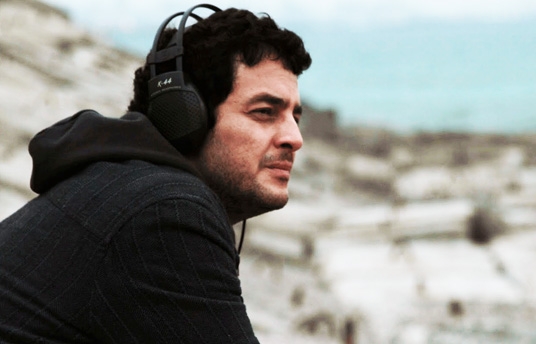DFI Film Review: Microphone
Sep 17, 2012

By Reem Saleh, Digital Department, DFI
Film: Microphone
Year: 2010
Director: Ahmad Abdalla
Stars: Khaled Abol Naga, Menna Shalabi and Yousra El Lozy
Running Time: 120 min
Genre: Drama
After years of living in the United States, Khaled (Khaled Abol Naga) returns home to Alexandria, Egypt to mend the broken pieces of his life and bond with his father and his former lover Hadeer (Menna Shalabi). At the same time he discovers his city’s local artists’ underground life.
The narrative focuses on the lives and struggles of Graffiti artists, skateboarders, independent music bands and film students. Their stories come together through Khaled who, by roaming the streets, is left amazed at changes which have taken place during his absence. His unresolved personal issues take a back seat as he supports those who need a proper platform to express themselves. When everything else has failed around him, the artists revive his hope; giving them a voice becomes his mission.
Inspired by their stories, director Ahmad Abdalla integrated real artists in his fiction. Mixing the genres – documentary and drama – introduced audiences to their work and gave the film a genuine insight to what these young talents have to say. Khaled Abol Naga’s superb performance with first time actors makes it hard to differentiate between real events and acting – he successfully managed to portray a stranger in his own country. We discover, with him, what Alexandria has to offer other than what’s found on tourist guides.
“Microphone”, Ahmad Abdalla’s second feature, presents an interesting portrait of Alexandria. Shot entirely in digital, it is one of the first feature films to shift from cinema in Egypt (previously implemented by Ibrahim el Batout). With no written dialogue or clear plot, Abdalla’s experimental film plays with technical tools flexible enough to get production going with a low budget. The Canon EOS 7D camera he used to shoot, he says, “was a tool that couldn’t be replaced by film…besides we didn’t know what we were filming; we didn’t have a plan or fixed deals with the artists. We needed a small camera, sensitive to low light, where we could change lenses to keep up with my artistic and aesthetic needs. I still believe in the digital camera, at least for me it suits perfectly the type of films I make.”
It is still a long and exhausting battle for alternative filmmakers to compete with Egypt’s commercial mainstream. Producers find digital a risky deal; the majority of the audience is not used to what’s beyond mere entertainment. But films like “Microphone” are gathering international recognition and paving the way for emerging filmmakers to believe in digital cinematography’s large capacity. “I can shoot a large amount of footage that doesn’t cost much, not like cinema at least,” Abdalla says. “We can improvise more, not only with the script but also with the locations as we were following musicians. I couldn’t have had a cinema camera with all of the lighting equipment. In editing, the process and the costs differ.”
“Microphone” premiered at the Toronto International Film Festival in 2010, won Best Arabic Film at the Cairo international Film Festival, Tanit D’or for Best Film at the Carthage Film Festival, Muhr Award for best editor at the Dubai International Film Festival and the Golden Tulip for Best Film at the Istanbul International Film Festival. If you’re travelling this month, Qatar Airways is currently playing the film on its in-flight entertainment system.